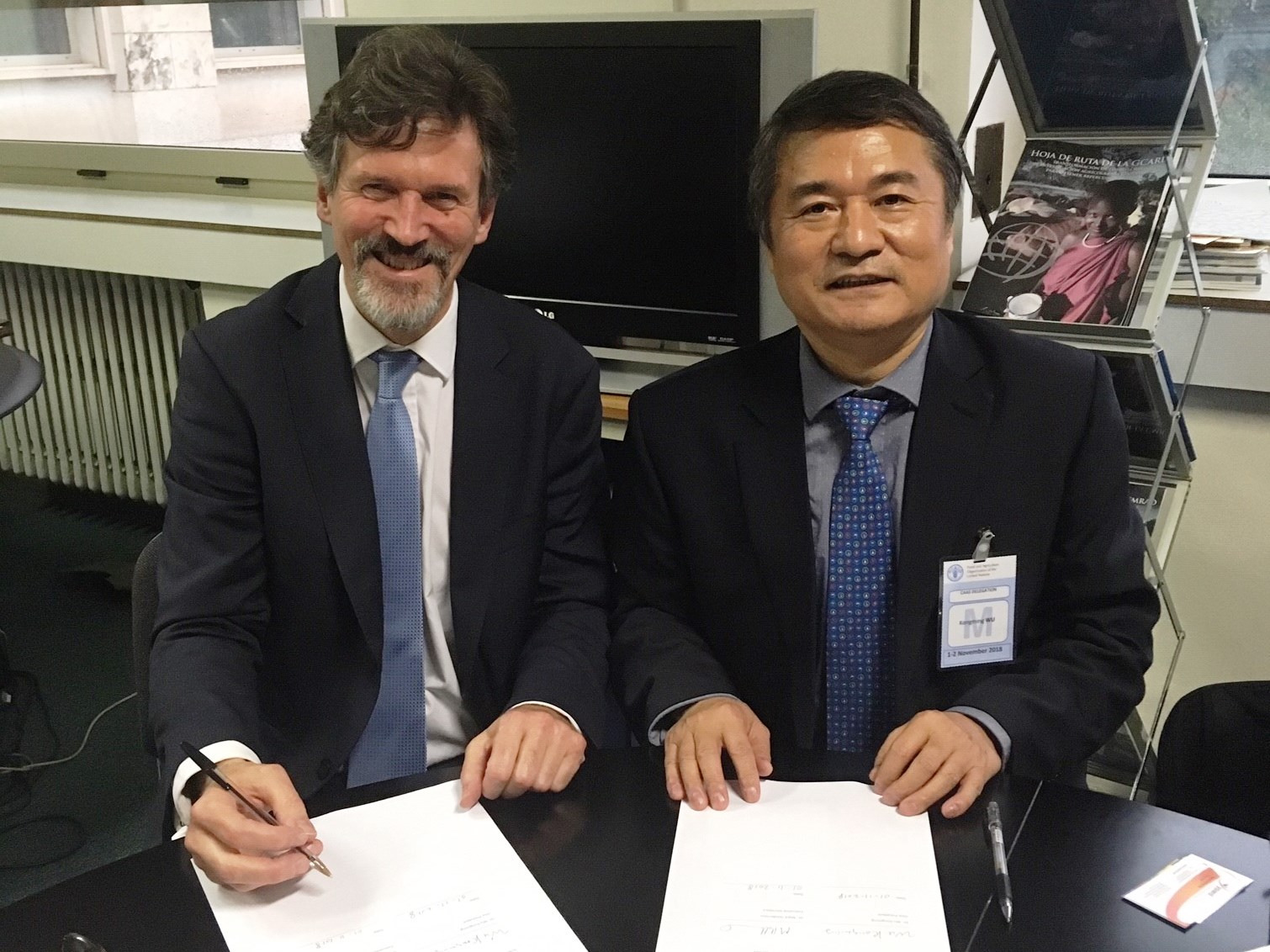
Members of GFAR Secretariat were pleased to welcome yesterday a delegation from the Chinese Academy of Agricultural Sciences (CAAS) to formalize the basis for direct future partnership and collaboration between GFAR and CAAS, through the signing of a Letter of Intent. CAAS is taking its place as an important international actor in agricultural research for development, through its skills in both providing relevant technologies for millions of smallholder farmers in China and in its cutting-edge research in areas such as agricultural genomics and molecular breeding, agricultural information technology and big data, intelligent equipment and novel vaccines. China is now the world’s largest public sector investor in agricultural research and a key driver of the global AR4D agenda.
CAAS regards GFAR as an important network and platform for agricultural development, that can help engage agricultural science with society’s needs and open out discussions with all stakeholders to address key Sustainable Development Goals, in China and worldwide. As a Partner and Steering Committee member in GFAR, CAAS aims to work together with other Partners in the Global Forum on issues of youth in agriculture, extending innovations and technologies through innovation platforms, strengthening partnerships, and fostering and mentoring South-South cooperation via the G20 MACS and other multilateral linkages.
"China needs to learn more, but we have a lot of knowledge to share," remarked CAAS Vice-President, Dr. Wu Kungming, with regard to the numerous technologies China has to offer developing countries. He added that all the nations of the world "have so many common issues, so we need to share information, knowledge and technologies. We have many common agricultural problems, but this also means that the opportunities for valuable partnership are bigger." The challenge of the Fall Armyworm outbreaks in Africa and South Asia is an example of such an opportunity. CAAS leadership is optimistic that the Fall Armyworm can be handled effectively in Africa and Asia, given the right international coordination and action.
The Letter of Intent foresees provision by GFAR Secretariat of consultation services as a strategic think tank on such challenges as building inclusive and effective partnerships. Through exercises in foresight, GFAR can also help CAAS to assess farmers' desired futures over the long term so that communities can help shape research and make informed choices on the technologies and innovations that can help deliver those outcomes. All agreed that understanding real demand early on is crucial: farmers need to be involved at the beginning of the debate on innovation, not at the end.
Dr. Wu also emphasized the need to educate young farmers in China as modern farmers. In recent years, CAAS has launched initiatives to create a supportive environment for talent growth encouraging innovation and entrepreneurship. In 2017 CAAS initiated a Young Talent Plan (2017–2030) that aims to increase the academy’s under-45 research cohort to approximately 4,750 by 2030. In order to make young researchers a driving force behind agricultural research, CAAS will also reform its human resource development system and incorporate 30 specific measures that address talent acquisition, cultivation, settlement and service support, as well as incentive mechanisms and researcher evaluations. There is much scope here for CAAS to link with GFAR's work on transformational learning and student leadership. YPARD Global Coordinator, Yemi Adeyeye, signaled the willingness from YPARD to engage with the GFAR-CAAS partnership by drawing on its network of more than 17,000 members and 72 national chapters, to crowd-source evidence and stories that GFAR-CAAS projects can explore to make evidence-based decisions during project development. Similarly, YPARD will raise awareness of study opportunities at CAAS through its network.
The Letter of Intent outlines other areas for cooperative activities between GFAR and CAAS:
- Jointly elaborate and initiate international programs to support poverty alleviation and rural revitalization through application of scientific research results;
- Co-convene international dialogues and conferences, in particular finding linkages between the agenda and operation of the GCARD and GLAST processes;
- Data, information and knowledge sharing to strengthen the access, transformation and use of agri-food data and information to the benefit of resource-poor smallholders around the world; this will include developing decentralized information resources/databases.
- Link GFAR’s technical advisory inputs and international strategic networking support to key Chinese agenda, in particular regarding CAAS’ role in implementation of the Belt & Road Initiative in Central Asia and Africa and the introduction of local innovation platforms in delivery of the 2018 National Strategic Plan for Rural Vitalization;
- Support the strategic development of CAAS, strengthening the capabilities and international engagement of CAAS and Chinese institutions through the mechanisms of GFAR
Both CAAS and GFAR Secretariat recognized great potential in building stronger linkage between CAAS and the GFAR network of partner organizations and look forward to close collaboration developing in each of these areas.
Read more here about the participation of Executive Secretary Mark Holderness at the 2nd International Conference on Agricultural Research, held on 24-29 September at CAAS Headquarters in Beijing, and his presentation of a paper on ‘Collective Action, the future for Agricultural Research and Innovation’.
Photo at top: Dr. Mark Holderness of GFAR Secretariat and Dr Wu Kungming, Vice-President of CAAS sign the Letter of Intent
